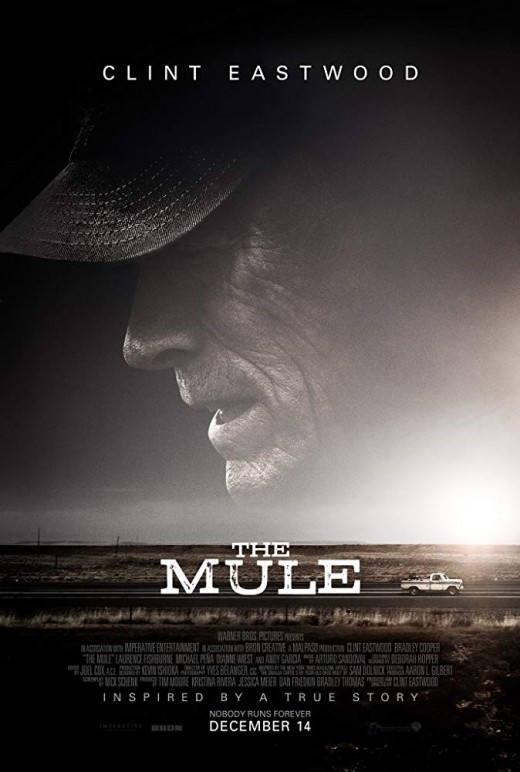Form Horticulture To Drug Culture: The Mule

Synopsis
Earl Stone had made a living as a renowned hortaculturist in Illinois, specializing in prize-winning daylilies. His activity, however, came at the cost of his wife and daughter, who distanced themselves from him. Further, Earl fell on hard times, losing his business and his home. In The Mule, Earl (Clint Eastwood) gets a job tip when he attends a party at the home of his granddaughter, Ginny (Taissa Farmiga). He gets a tip about some work which will involve travel, which Earl has never minded. He pulls into a tire store that acts as a front for a Mexican drug cartel. They give him instructions, which he follows, and finds a handsome financial reward. He puts his earnings to get back his home and to purchase a brand new truck. As Earl gets back on his financial feet, he tries to make amends of some sort with his ex-wife, Mary (Dianne Wiest) and daughter Iris (Alison Eastwood). Neither are impressed with the man who knowingly spent too much time focused on his career, but that doesn't stop Earl from trying to reconcile with these ladies.
While he has the admiration of the cartel boss Laton (Andy Garcia), others see Earl as a potential liability. One such person is Julio (Ignacio Serricchio), who confronts Earl and tells him that he has been assigned to be Earl's handler. Laton, in fact, wanted to see if Earl would be suited to a more prominent position. Unfortunately for Laton, he did not get a chance to discuss his plan with Earl, as others in the cartel eliminate Laton. Julio then demands strict timetables for Earl. As Earl's loads grow larger, DEA Agent Colin Bates (Bradley Cooper), a veteran with some huge drug busts, gets transferred to the agency's Chicago office, where he is teamed with Agent Trevino (Michael Pena) and reports to an unnamed Director (Laurence Fishburne). They convince a low-level cartel dealer named Rico (Victor Rasuk) to report about the activity he knows, though he only knows of Earl by an alias. When the Director approves monitoring cartel cell phone calls, they get a lead on Earl. Earl, though, gets some emergency news from Ginny in the midst of a run that could spell grave danger for him.
Evaluation
The Mule is based on the real life drug runner Leo Sharp, and the article Sam Dolnick wrote about this aged runner. Eastwood directs, and makes his first screen appearance since Trouble With The Curve in 2012. The scenario comes from Nick Schenck, who also wrote Gran Torino for Eastwood. The Mule is an entertaining look at a man who comes to understand that money can help in certain areas, but that pursuit had hurt his family bonds. The same person who could be pleasant to fellow flower growers failed to put that same sort of effort into the people closest to him. Like many a man of his generation expected to be a family's main provider, Earl thought that his newfound wealth might make a difference. That proved to be true only to a small extent. This film, unlike Gran Torino, doesn't have an emotional impact until the concluding portions. This film also lacks the characterization of Gran Torino, and the conflicting attitudes of the cartel toward Earl don't make sense, since Earl does his runs on time and without attracting attention.
Still, Eastwood is the one working director who knows himself the best. His portrayal of Earl shows flashes of the familiar Eastwood screen persona. Earl may be a little more personable than most of his characters, but the Korean War veteran also shows a toughness and a directness comparable to his famed Dirty Harry character. Those traits are shown to humorous effect in his encounter with a pack of lady bikers. He also shows a more sentimental and dramatic side in his scenes with Wiest. Garcia is solid as Laton, a boss who believes in rewarding good work as he sets up an appreciative Earl with company when Earl attends a party at his Mexican estate. Wiest is also enjoyable as Mary, who starts to see the man she first met and married. Cooper, Pena, and Fishburne are also good in smaller roles.
Conclusion
The Mule gives viewers the now rare opportunity to see Clint Eastwood on the screen. He may be far beyond the days of his westerns and police movies, but he makes his returns to the screen count in a meaningful way to his fans and prospective viewers. The Mule is not only a picture about a man lamenting his decisions regarding family, but it also speaks to economic conditions that cause men like Earl Stone to take risks to make ends meet. It's been said that the business of America is business, but that belief can make the relationship between business and consumer too impersonal. I don't condone Earl Stone's worst decisions, but this movie suggests that condemnation of a man who has made such choices is just as wrong. He should never have been in a spot where he became so desperate.
On a scale of zero to four stars, I give The Mule three stars. Eastwood shows he's still kicking.
The Mule trailer
© 2018 Pat Mills



